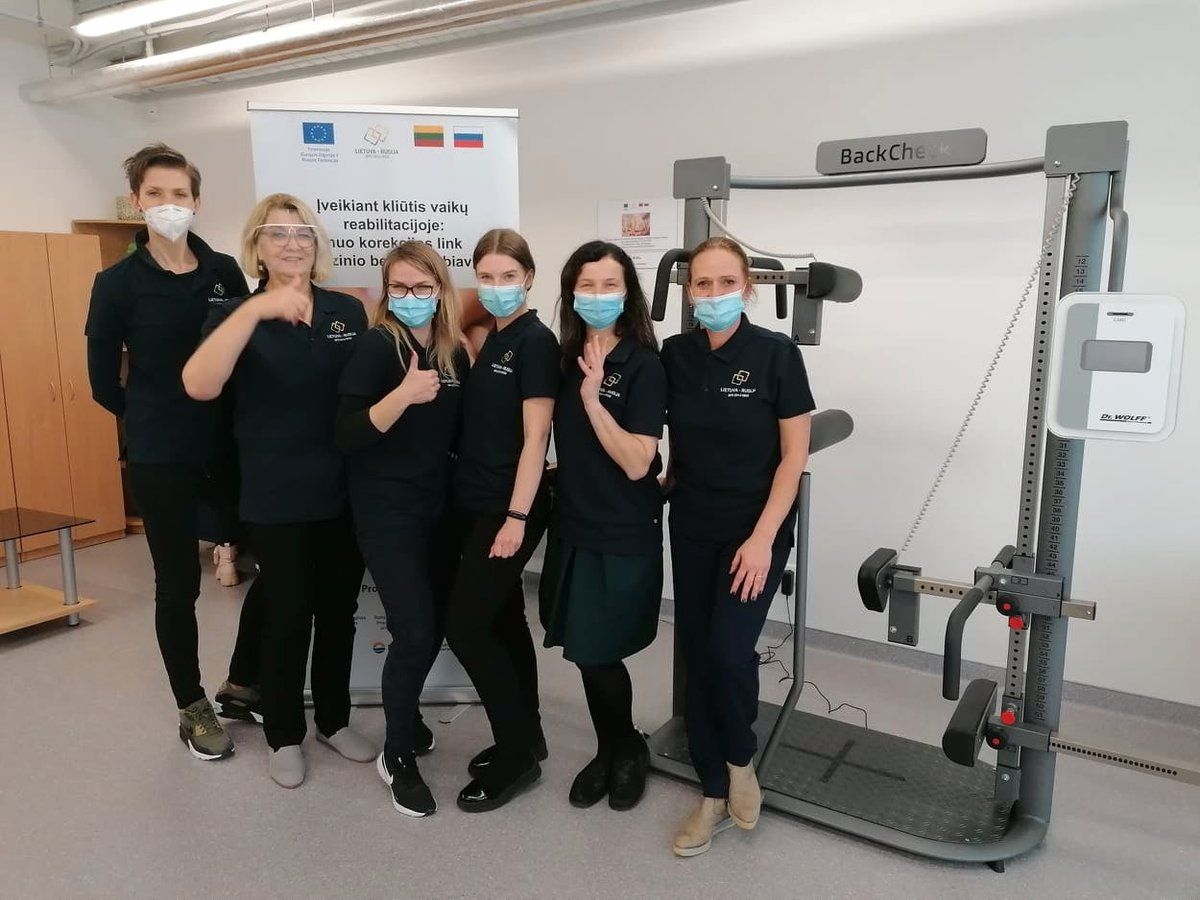Breaking barriers in children rehabilitation
A holistic approach and an early intervention can change a child’s future. Children with psychomotor disorders, psychiatric or behavioural issues often show a complex of symptoms that need to be addressed as soon as possible and from different points of view. However, it is not easy. Parents are afraid of the diagnosis; they do not recognise some of the symptoms as relevant or they get lost in the vast amount of information. As a result, these children are often left out of the system and then it may be too late. That’s what the BREAK project is changing in the Lithuania-Russia cross-border region: breaking the barriers in children rehabilitation, creating a safe place where they can be orienteered and treated from different perspectives, where they benefit from early diagnosis and intervention. In a word, trying to offer them a better future.
Not being able to speak at the age of three; not reacting at the name being called; not paying attention at what happens around… These are some of the signs that may go unnoticed but that are crucial to detect whether there could be a neurological problem behind the development of a child. “Many parents call us and say: I have a child who is absolutely healthy but he is just not speaking”, explains Professor Dr. Brigita Kreiviniene, from the Lithuanian Sea Museum (BREAK project beneficiary). “But if you are unable to speak at three or four, there is obviously an issue” she continues… However, parents do not have a reference to compare to, they are afraid of an official diagnosis, or they prefer to wait for a potential improvement. “Our objective is to change that: it is not tomorrow, it is now”, explains Brigita.
In this sense, the BREAK project provides timely, high-quality and affordable assistance to children with psychomotor disorders. According to the TEREMOK Health Centre – lead partner of the project – the main cause of invalidation among the children of the Kaliningrad region is connected to the nervous system and mental disorders (about 50% of the cases). And the number of affected children is increasing. A similar situation can be observed in the bordering areas of Kaliningrad, and in the rest of Europe. Prevention, early detection and the provision of corrective assistance can prevent the formation of persistent health disorders and disabilities in the future.
The BREAK project has brought together two Universities – the Klaipeda University in Lithuania and the Immanuel Kant Baltic Federal University in Kaliningrad (Russia) – the Children’s Psychoneurological Health Center “Teremok” (Russia) and the Lithuanian Sea Museum.
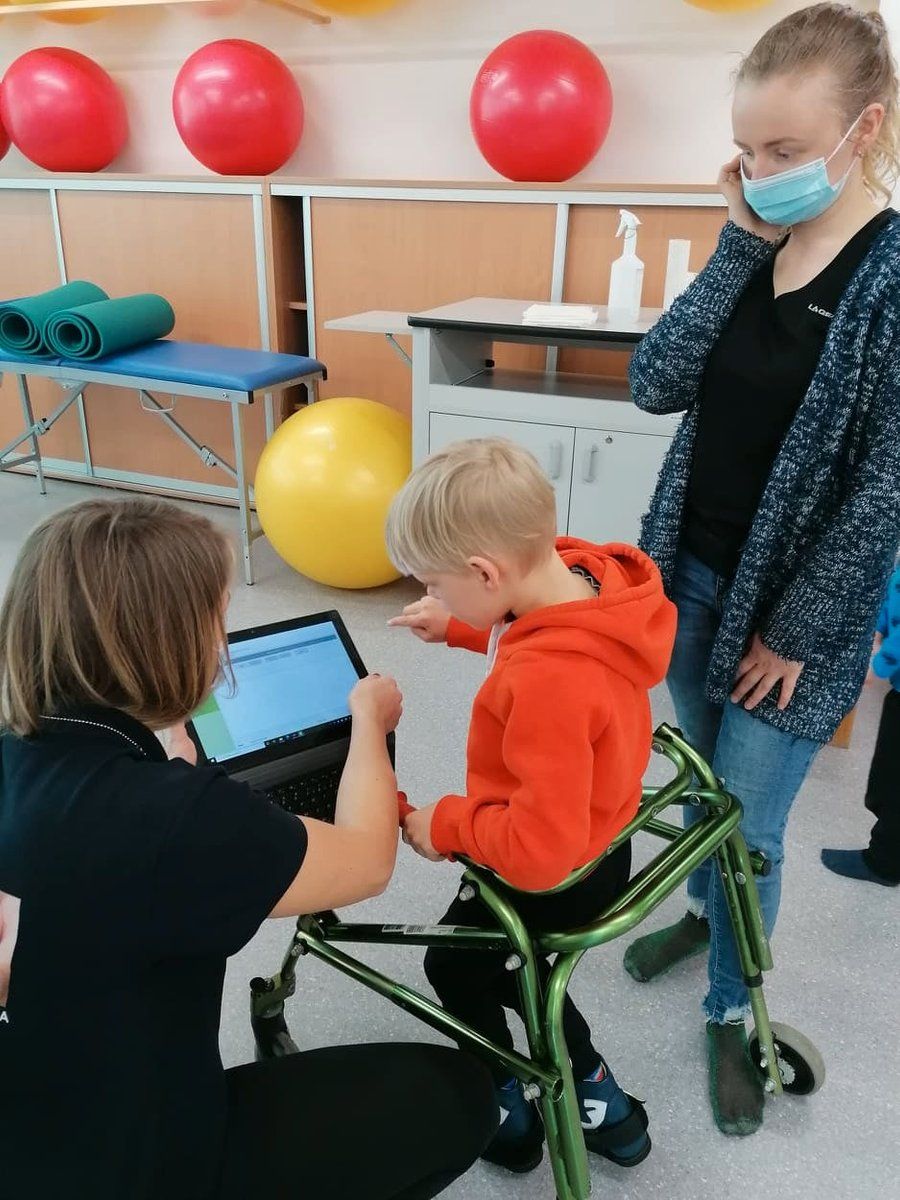 The two universities focus on the early diagnosis of children. They have established research laboratories to evaluate children in a more efficient and timely manner. Klaipeda University has installed for example neurosensory equipment through which they are monitoring the balance capacity of around 100 children in the region, they are analysing the reaction of the muscles and studying the human gait or the condition of the feet. After a thorough analysis and consultations with the parents, the children get a series of recommendations and an assisted therapy programme on a case by case basis. The University has also acquired a “simulation suit” which can be worn to experience almost the same feelings as a person who suffers from neurosensory motor disabilities such as hemiparesis, joints stiffness, hearing or visibility impairments. “We are using
The two universities focus on the early diagnosis of children. They have established research laboratories to evaluate children in a more efficient and timely manner. Klaipeda University has installed for example neurosensory equipment through which they are monitoring the balance capacity of around 100 children in the region, they are analysing the reaction of the muscles and studying the human gait or the condition of the feet. After a thorough analysis and consultations with the parents, the children get a series of recommendations and an assisted therapy programme on a case by case basis. The University has also acquired a “simulation suit” which can be worn to experience almost the same feelings as a person who suffers from neurosensory motor disabilities such as hemiparesis, joints stiffness, hearing or visibility impairments. “We are using 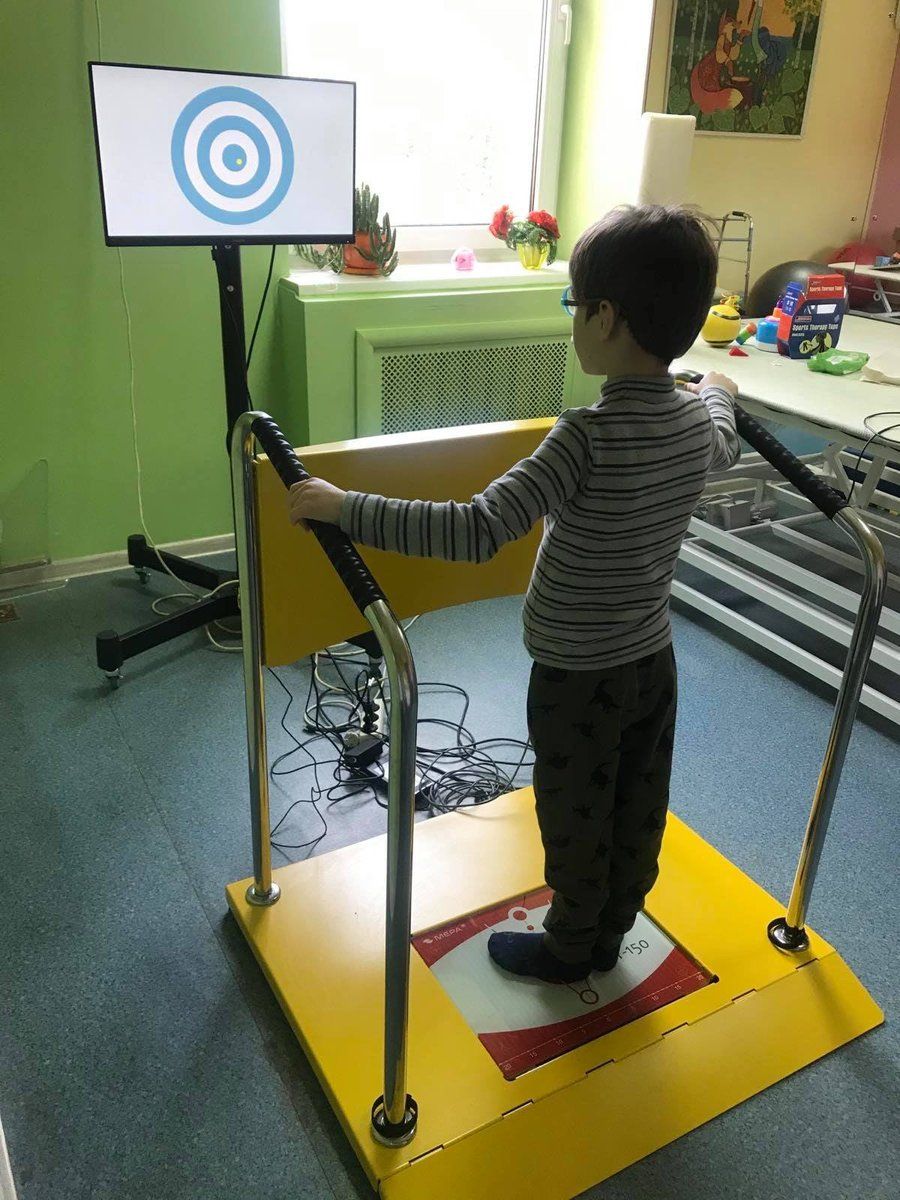 this suit with parents, medical specialists and with our students. So that they can know what the children’s needs and difficulties are when moving around, trying to call on the phone or to write something down on a piece of paper”, explains Rita Gikarienė, from Klaipeda University (Department of Holistic Medicine and Rehabilitation of the Health Science Faculty). Indeed, the research laboratories are not only used to evaluate the children but also to train current professionals and University students.
this suit with parents, medical specialists and with our students. So that they can know what the children’s needs and difficulties are when moving around, trying to call on the phone or to write something down on a piece of paper”, explains Rita Gikarienė, from Klaipeda University (Department of Holistic Medicine and Rehabilitation of the Health Science Faculty). Indeed, the research laboratories are not only used to evaluate the children but also to train current professionals and University students.
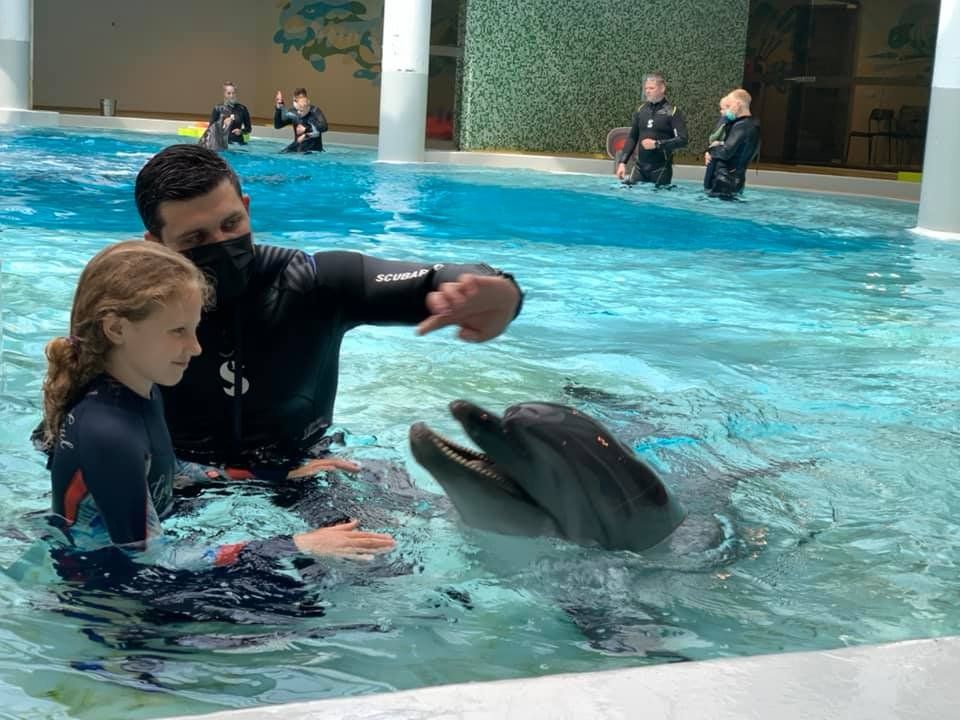 On the other side, the TEREMOK Center and the Lithuanian Sea Museum are institutions providing a holistic approach to the rehabilitation of the children. The Sea Museum is not just a museum, it is a complex centre with a therapy department: one of the main activities they conduct is dolphin-assisted therapy. This is a complementary, alternative method that helps children with different sensory issues, such as concentration loss, gross and fine motor skills difficulties or linguistic expression, among others. The water is a very particular environment, it stimulates the vestibular sensory system, which is the one in charge of the sense of balance and spatial orientation, for coordinating movement and balance. The water provides a widening experience, the senses are stimulated and this allows children to concentrate better, relieve tensions and prevent emotional tantrums and irritability. “Children enjoy the water; this is a fact. Furthermore, we count with a very special assistant, a dolphin, who is a very friendly (and active) companion that creates all sort of social situations for the children”, explains Brigita. These children prefer order, clear rules… while the dolphin simulates our society, it is in constant movement, it behaves unexpectedly and so, the social experiences are widened for the children.
On the other side, the TEREMOK Center and the Lithuanian Sea Museum are institutions providing a holistic approach to the rehabilitation of the children. The Sea Museum is not just a museum, it is a complex centre with a therapy department: one of the main activities they conduct is dolphin-assisted therapy. This is a complementary, alternative method that helps children with different sensory issues, such as concentration loss, gross and fine motor skills difficulties or linguistic expression, among others. The water is a very particular environment, it stimulates the vestibular sensory system, which is the one in charge of the sense of balance and spatial orientation, for coordinating movement and balance. The water provides a widening experience, the senses are stimulated and this allows children to concentrate better, relieve tensions and prevent emotional tantrums and irritability. “Children enjoy the water; this is a fact. Furthermore, we count with a very special assistant, a dolphin, who is a very friendly (and active) companion that creates all sort of social situations for the children”, explains Brigita. These children prefer order, clear rules… while the dolphin simulates our society, it is in constant movement, it behaves unexpectedly and so, the social experiences are widened for the children.
Approximately, twenty families from the Klaipeda region benefitted from an intense two weeks rehabilitation programme, including dolphins-assisted therapy. The Klaipeda University measured different parameters in neurosensory motor spheres before and after the sessions, and they could already observe very positive results. “Active reflexes improved, also the tactile defensiveness. There were children who could not even be evaluated before the sessions, they were too afraid explains Rita. “Now parents have all asked us: “When can we come again?”, adds Brigita.
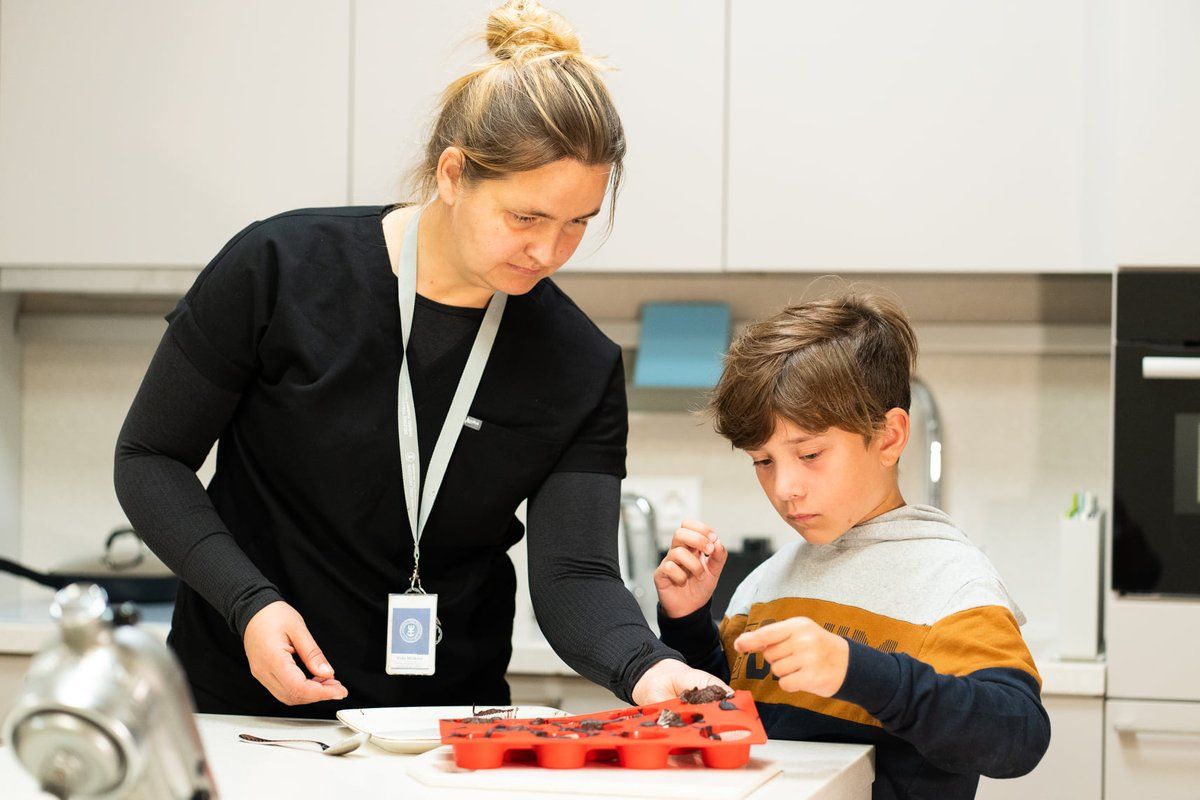
The therapy centre is also teaching the children social skills. The idea is that they can learn how to do small daily tasks, like preparing a sandwich, tidying up their room or making a tea for mom and dad. “We first analyse what they are already capable of doing. For example, if they can distinguish black from white, they can separate white clothes from coloured ones, so we teach them to start a washing machine”, explains Brigita. In another programme, they are teaching the children to make cookies. With this activity, the kids understand that there is a process, some steps to be followed and that some planning is needed. “After completing all the steps, the kid sees immediate, real results and feels fulfilled”, explains Brigita.
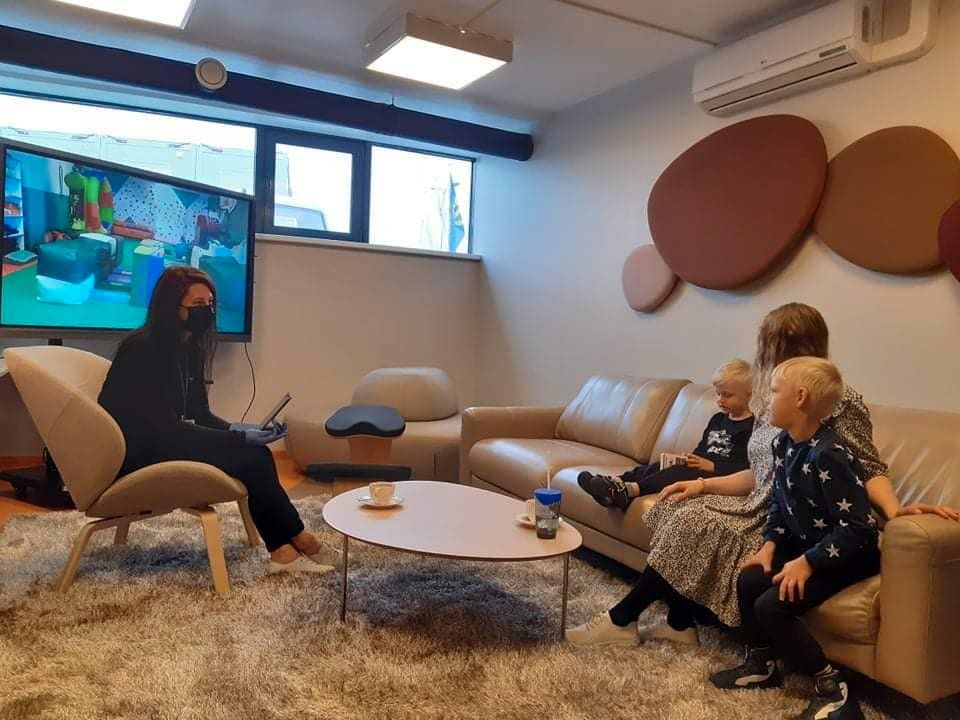 While teaching these skills, experts have also noticed how parents can sometimes “over parent” their children. Their concerns about doing everything for their kids with disabilities, can lead to parental burnout. To help them, the Museum is conducting training also for the parents. “They need to understand that their children are capable of doing many things for themselves, so we are recording our therapy sessions, analysing them with the families, comparing reactions and showing the improvements to the parents so that they can imitate the process at home”, explains Brigita. The video-analysis laboratories, as they call this technique, has proved very useful for both the parents and the children. “After implementing our recommendations – continues Brigita – the parents come back to us, we review the process and update it accordingly. It works both ways, after all, we think that the family members are the best specialists, they spend 24 hours a day with their kids, so we try to work as a team incorporating also their views”.
While teaching these skills, experts have also noticed how parents can sometimes “over parent” their children. Their concerns about doing everything for their kids with disabilities, can lead to parental burnout. To help them, the Museum is conducting training also for the parents. “They need to understand that their children are capable of doing many things for themselves, so we are recording our therapy sessions, analysing them with the families, comparing reactions and showing the improvements to the parents so that they can imitate the process at home”, explains Brigita. The video-analysis laboratories, as they call this technique, has proved very useful for both the parents and the children. “After implementing our recommendations – continues Brigita – the parents come back to us, we review the process and update it accordingly. It works both ways, after all, we think that the family members are the best specialists, they spend 24 hours a day with their kids, so we try to work as a team incorporating also their views”.
This is what makes the BREAK project really special: beneficiaries participate in the rehabilitation process. “We are a team and we do not see things only from one perspective. This is very important in neurosensory motor disorders – continues Brigita – if psychologists, parents, social workers and medical specialists do not work hand in hand, the result for the development of the child will not be satisfactory. We need a single rehabilitation programme, we need to break the barriers in the rehabilitation process”.
Soon, in December, the project team will hold a festival to raise awareness about the children with disabilities. They will invite all pre-schoolers and schoolers with and without disabilities, so that they can meet, learn how to communicate and play together, without prejudices or fear of differences. In this way the BREAK project is aiming also at achieving a cultural change: being different is not wrong, and definitely it is not a barrier to friendship.
